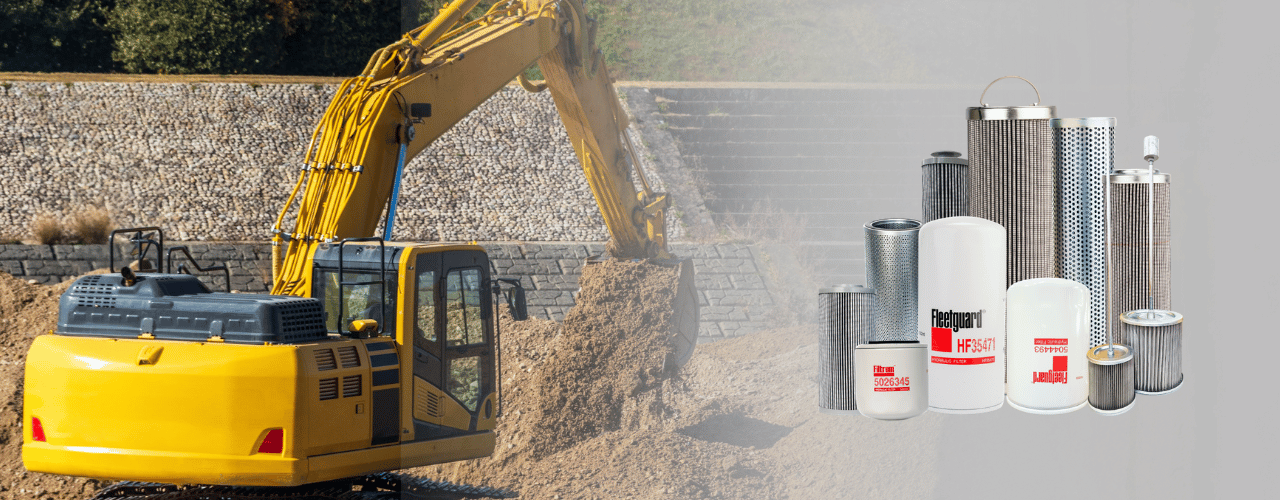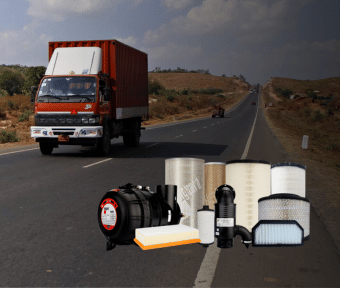Product | 19 Dec 2024
Heavy-duty machinery operates in some of the harshest environments, handling immense workloads day in and day out. Their reliability and performance are not just essential, but critical. One of the commonly overlooked aspects of maintaining these machines is the quality of the filters used. Low-grade filters can have devastating consequences on machinery performance and longevity, leading to increased operational costs, unexpected downtimes, and even total equipment failure. Let’s understand how poor-quality filters can damage heavy-duty machinery and the importance of investing in high-quality filtration solutions.
The Role of Filters in Heavy-Duty Machinery
Filters are the unsung heroes of heavy-duty machinery. Whether it's an engine, hydraulic system, or fuel delivery system, filters are crucial in ensuring that only clean fluids circulate within these complex machines. They are designed to trap contaminants such as dirt, dust, metal particles, and other debris that could otherwise cause significant damage to sensitive components. A well-functioning filter is essential for maintaining optimal performance, reducing wear and tear, and extending the life of your heavy-duty machinery.
However, not all filters are created equal. The difference between a high-quality filter and a poor-quality one can be the difference between a machine that runs smoothly for years and one that is plagued by constant breakdowns and repairs.
Consequences [1] [2] of Using Low-grade [3] [4] Filters
Using substandard filters in heavy-duty machinery is a risk that no operator or business should take. The dangers associated with poor-quality filters can manifest in several ways, all of which can have severe implications for the performance and longevity of heavy-duty machinery.
1. Increased Wear and Tear: Poor-quality filters are commonly made with inferior materials that do not provide adequate filtration. This allows contaminants to pass through and circulate within the machinery, increasing wear and tear on important components. For instance, an engine that ingests dirty oil or air will suffer from accelerated wear on parts like pistons, bearings, and seals. Over time, this can result in costly repairs and a shorter lifespan for the engine.
2. Reduced Efficiency: Contaminants that slip past poor-quality filters can cause blockages and restrictions within the machinery’s systems. For example, clogged fuel injectors can lead to poor combustion, reduced power output, and increased fuel consumption. Similarly, hydraulic systems with contaminated fluid may experience sluggish operation, leading to inefficiencies and potential system failures. In both cases, the machinery will have to work harder to achieve the same level of performance, leading to increased exertion, operational costs and reduced efficiency.
3. Increased Risk of Component Failure: Poor-quality filters are one of the major factors that significantly contribute to the risk of component damage in a vehicle. Contaminants that are not properly filtered out can accelerate wear and tear on critical engine parts. For example, a substandard oil filter might allow metal particles to circulate in the engine, potentially leading to issues such as increased friction or wear. Such failures can result in costly repairs, unplanned downtime, and reduced operational efficiency for a company.
4. Increased Maintenance Costs: Machinery fitted with inferior filters will require more frequent maintenance to keep it running smoothly. The filters themselves may need to be replaced more often, and the damage caused by inadequate filtration can lead to more frequent repairs. This can quickly add up, turning what seemed like a cost-saving decision into a significant financial burden. Moreover, the unpredictable nature of equipment breakdowns can strain maintenance teams, leading to rushed repairs and potential safety hazards.
The Long-Term Impact on the Lifespan of Machinery
The long-term impact of using poor-quality filters cannot be overstated. Operators of heavy-duty machinery expect these devices to last for many years, given their substantial investment. On the other hand, poor filter quality can significantly shorten this equipment's lifespan. The presence of pollutants accelerates wear and tear on the machinery, increasing the frequency of repairs and ultimately resulting in the equipment's premature retirement.
In contrast, investing in high-quality filters can help extend the life of heavy-duty machinery. These filters are made to offer the best defense against impurities, guaranteeing that the equipment keeps working at its best for extended periods. High-quality filters lower the chance of unplanned failures by keeping fluids clean and shielding delicate components. In turn, they help in minimizing maintenance costs and maximize the return on investment in the machinery.
Conclusion
In the world of heavy-duty machinery, the quality of filters used is not just a minor detail; rather, it is a crucial component that determines the equipment's longevity and performance. While initially inexpensive, low-quality filters can have disastrous long-term effects, including increased wear and tear, decreased efficiency, catastrophic breakdowns, and exorbitant maintenance expenses.
Choosing the right filters is essential to protecting your investment in heavy-duty machinery. Market offers a wide range of options but not all filters are created equal and are up to the mark. It’s important to select a solution that meets the highest standards of performance and reliability.
Among the available choices, Fleetguard stands out as a well-established brand, trusted for its superior quality and durability. By investing in high-quality filters like Fleetguard, you're ensuring your machinery stays protected and performs at its best for years to come. Fleetguard filters offer the reliability and advanced filtration needed to keep your equipment running smoothly and efficiently.
Investing in high-quality filters by a well known brand like Fleetguard, is an investment in the future of your machinery. With superior filtration and unmatched durability, Fleetguard filters provide the protection needed to keep heavy-duty equipment running smoothly and efficiently for years to come. Ensure quality by choosing Fleetguard filters to protect your valuable machinery.








